
Department of Biochemistry
Started in 1991

INTRODUCTION
After the start of college in 1991, In Jan. 1994, the department of Biochemistry started functioning independently for all activities including investigative services. Since then the department has progressed rapidly in terms of expansion in patient care services, recruitment of faculty members, paramedical and supportive staff and installation of sophisticated and modern equipment in the laboratories.
The department has paramedical and ministerial staff of about (fifty members i.e. SMLT, MLT Gr- I, Lab Attendant & ministerial staff clerk, Attendant & safaikaramchari) to provide routine as well as round the clock emergency services.
STAFF
- 02 Senior Residents
- 07 Demonstrators,
- 10 PG Student
- 50 Non-teaching Staff
SERVICES
Teaching & Training
- MD: Started in 2016 with 03 seats per year, increased to 06 seats per year since 2021.
- MBBS: 50 students till 2012, 100 students from 2013-2018 and 150 students since 2019.
- BSc (Medical Lab. Technology): 3 years course, 12 students/year.
- B.Sc. Ophthalmology 04 students/ year.
- B.Sc. Anaesthesia & Operation Theatre Techniques 16/ year
- MLT Vocational Training Course: The students are posted in the department as a part of their internship training.
- Post Graduate Teaching, Training & Thesis related research: PG Junior residents from the department of Pathology and Forensic Medicine are posted in Biochemistry for one month and trained for various biochemical tests procedures.
- Thesis related research work support is being extended to various clinical and paraclinical departments.
- A well equipped students lab is available for MBBS & Paramedical courses
DIAGNOSTIC LABORATORY WORK
-
The Clinical Chemistry Laboratory was established in Feb.1994. and the Emergency services were started in May, 1997. The department from its inception aimed to improve the area of investigative medicine with advancement of technologies used and expansion of test profiles to meet the requirements for patient care.
At present the department has recent updated facilities for investigative work, teaching-training and research in Clinical Biochemistry. In addition, the department is managing a centralized OPD blood collection centre.
- The department is equipped with state of art equipment like:AU 5800 Random Access Chemistry Analyzer, RxImola Random Access Chemistry Analyzer, Advia Centaur XPT Chemiluminescence Analyzer, Bio Rad D10 HPLC, HbA1c Analyzer, Metabolite and Blood Gas Analyzer-ABL800, Tecan Freedom Evo fully automated Elisa reader and Washer, Double beam spectrophotometer, Fluorescence spectrophotometer, PCR, DNA Electrophoresis, Gel Documentation system, HPLC, Atomic absorption spectrophotometer.
- The department caters to an average of 900-1000 samples per day from outpatient and inpatients along with providing 24 hrs diagnostic services to the patients admitted in critical care and emergency units.
- In all approximately more than 80 parameters are done in the department which includes routine as well as specialized investigations.
- 24 hr. Emergency services are provided for the patient care and about 40 investigations are done round the clock.
- Starting with 20,000 tests per year in 1995, approximately 25,00,000 tests are being carried out per year presently in routine as well as emergency clinical biochemistry.
- The reports of investigations done in the Department are available via HIMS.
- Hospital Services:
-
Centralized Blood Collection Centre
Location: Ground floor, B Block
Timings of Blood Collection Centre
Monday to Friday
timing
Timing during summer vacation
8.00 am to 3.00 pm
7:00 AM to 12:00 Noon
Saturday
8.00 am to 12.00 pm
7:00 AM to 12:00 Noon
Clinical Chemistry Lab
Location: Room No 1306-1307, Ground Floor, B Block
Endocrinology, Immunology, Molecular and Toxicology Lab
Location: Level IV, E Block

| ROUTINE & SPECIAL INVESTIGATIONS DONE IN THE DEPARTMENT | |
|---|---|
| 1. Sodium 2. Potassium 3. Potassium 4. Chloride 5. Magnesium 6. Lithium 7. Ionised Calcium 8. Lactate 9. Glycosylated Hb 10. Microalbumin 11. Uric acid 12. Calcium 13. Phosphorus 14. Lithium 15. Magnesium 16. Iron 17. Copper 18. Cerruloplasmin 19. Bilirubin (T) 20. Bilirubin (C) 21. Alkaline Phosphatase 22. SGOT 23. SGPT 24. Total Protein 25. Albumin 26. Amylase 27. Lipase 28. CRP 29. ASO 30. RF 31. LDH 32. GGT 33. ADA 34. 24 hr Urinary Protein 35. 24 hr Urinary Creatinine 36. 24 hr Urinary Calcium 37. 24 hr Urinary Urea 38. 24 hr Urinary Phosphorus 39. 24 hr Urinary Uric acid 40. Urinary Sodium 41. Urinary Potassium 42. Urine Osmolality 43. Serum Osmolality |
44. Phenytoin 91. Zinc Other research parameters are done as per the availability of machinery & equipment and needs of the departments involved. |
| INVESTIGATIONS IN EMERGENCY BIOCHEMISTRY LAB | |
|---|---|
| 1. Sodium 2. Potassium 3. Chloride 4. Urea 5. Creatinine 6. Glucose 7. Bilirubin (T) 8. Bilirubin (C) 9. Total Serum Protein 10. Albumin 11. Amylase 12. Lipase 13. CPK(MB) 14. Calcium 15. ADA 16. LDH 17. CRP 18. Urinary Protein 19. Urinary creatinine 20. Urinary calcium |
21. Urinary sodium 22. i) Ascitic Fluid (Sugar) 23. ii) Ascitic Fluid (Protein) 24. iii) Ascitic Fluid (ADA) 25. i) Pleural fluid (Sugar) 26. ii) Pleural fluid(Protein) 27. iii) Pleural fluid( ADA) 28. i) C.S.F. (Sugar) 29. ii) C.S.F.(Protein) 30. iii) C.S.F. (ADA) 31. i)Knee Fluid - Sugar 32. ii)Knee Fluid - Protein 33. i) Synovial fluid Sugar 34. ii) Synovial fluid Protein 35. i) Abd. Fluid (Sugar) 36. ii) Abd. Fluid (Protein) 37. Other fluid (Sugar) 38. Other fluid (Protein) 39. ABG 40. Lactate 41. Ionised calcium |





